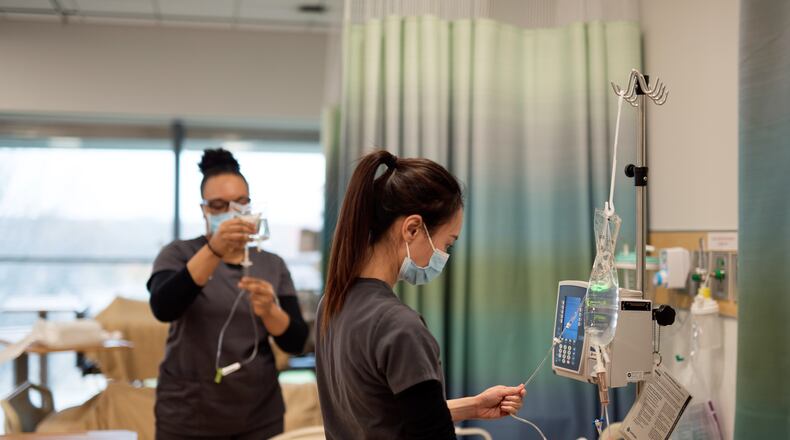Sinclair officials said the program will help fill a shortage of nurses in the Dayton region and will help students get a critical education at a lower cost. The new program is for people who already have a registered nursing license and want to further their training.
“We are so excited to work with our healthcare providers to make sure that this critical workforce need is filled to the best of our ability,” Steve Johnson, president of Sinclair, said.
Premier Health chief nursing officer and chief experience officer Lisa Gossett said the hospital hires registered nurses with both associate degrees and bachelor degrees, but offers programs for current nurses to continue their education.
“Research has shown that hospitals with a higher concentration of bachelor-prepared (registered nurses) have better patient outcomes,” Gossett said. “With this information, health care organizations have created plans to increase the number of RNs with BSNs.”
The Ohio Governor’s Office of Workforce Transformation estimates there are 8,357 annual job openings for registered nurses across Ohio, and projects that the need for nurses will grow by 1,225 new openings.
Locally, in the Dayton metro and surrounding area, there are currently 899 annual openings for registered nurses, with projected annual growth of 167 positions and a projected 1,286 postings over the next four years, according to Sinclair.
Sinclair already offers an associate degree for registered nurses, but the only bachelor of science in nursing (BSN) degree programs in the area were traditionally offered through four-year universities like Wright State University and Miami University.
Cathy Petersen, a spokeswoman for Sinclair, said the program is aimed at people who already have a two-year nursing degree and are already nurses, so it is different than the university programs.
To become a registered nurse in Ohio, a student needs to complete either an accredited two-year or four-year degree program and pass the National Council Licensure Exam. However, hospitals are seeing shortages of nurses and also want nurses who can perform at a higher level.
Sinclair said Dayton hospital employers have goals to increase the number of bachelor’s degree-prepared nurses caring for patients.
In 2010, the Institute of Medicine recommended the profession should increase the percentage of nurses who attain a bachelor’s degree to 80% by 2020 to take advantage of the full scope and practice of a nurse’s skill, because nurses are the people who have the most contact with patients in hospitals and can spot early signs that a patient’s condition is worsening.
“As we look to the future, I believe many healthcare organizations are looking at diversity of skillset within clinical care teams to ensure they are able to serve patients safely and provide the highest quality of care,” said Sarah Hackenbracht, president and CEO of the Greater Dayton Area Hospital Association. “One of the most important actions healthcare organizations can take is to build care models that help licensed care providers operate the highest level their license allows.”
About the Author

